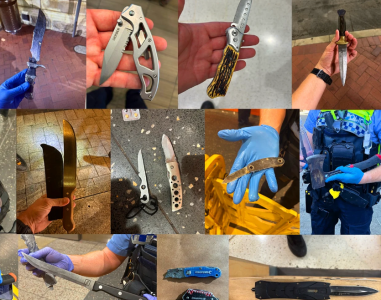Fines of up to $80,000 are being issued weekly under the new law
By
Gian T
- Replies 0
Did you know that simply carrying a knife—even for what you might think is a good reason—could land you with a fine of up to $80,000 or even a stint behind bars?
It’s a reality that’s catching many Aussies off guard, and the laws are only getting tougher in 2025.
Whether you’re a grandparent, a parent, or just someone who likes to be prepared, it’s time to brush up on the rules before you find yourself on the wrong side of the law.
Avinash Singh, a leading Australian lawyer, has sounded the alarm about a worrying trend he’s seeing 'weekly'—people, especially young Aussies, carrying knives in public.
Some say it’s for self-defence, others admit it’s just habit, but either way, the law is crystal clear: self-defence is not a valid excuse.
Singh explains, ‘Most of those carrying knives either wrongly believe they are allowed to for self-defence.
Or, they know they cannot carry knives for self-defence but do so anyway because the consequences of not carrying a knife are more severe than being caught with one.’
It’s a catch-22 for some, but the law doesn’t see it that way.
The issue isn’t just theoretical. In June, a 15-year-old boy in NSW was arrested after allegedly chasing three people with a machete near a shopping centre.
In Queensland, police shot a teenage girl who allegedly threatened people with a knife outside a Townsville pub.
These incidents are just the tip of the iceberg, and they’ve prompted lawmakers to crack down even harder.
Every state and territory in Australia has strict laws about carrying knives, and the penalties have ramped up significantly for 2025.
Here’s a quick breakdown:
And it’s not just about the penalties. Police now have more power than ever to search people without a warrant if they suspect someone is carrying a knife.
Metal detectors and random searches are becoming more common, especially in public places and around schools.
Some people may ask, ‘What if I need a knife for work or camping?’
The law does allow certain reasonable excuses, such as using a knife for work or training (like tradies or chefs), preparing food while camping, hunting or fishing, practising religion, participating in lawful sports or recreational activities (such as fishing or martial arts), displaying lawful exhibitions or collections, or wearing an official uniform that includes a knife.
But here’s the catch: self-defence is never a valid excuse. Even if you genuinely fear for your safety, the law says you can’t carry a knife for that reason.
Singh points out that many of the cases he sees involve young people from lower socio-economic backgrounds who have been assaulted or threatened themselves.
They feel that carrying a knife is the only way to stay safe, but the law doesn’t see it that way. Reporting threats to the police is the legal route, even if it feels less immediate.
Singh and other experts are calling for better education, especially in schools, to make sure young people understand the risks and consequences.
‘Enhanced education, particularly for young people, would be a positive step. Schools should consider adding a course so that young people are aware of the consequences of carrying knives and that self-defence is not a legal defence,’ Singh said.
While much of the focus is on young people, these laws apply to everyone. Maybe you carry a pocketknife for gardening, or you keep a small blade in your car for emergencies.
It’s important to know the rules in your state and make sure you have a lawful reason for carrying any kind of knife in public.
The bottom line? The days of carrying a pocketknife ‘just in case’ are over—unless you have a clear, lawful reason.
The penalties are steep, and ignorance is no defence in the eyes of the law.
 Have you ever been caught out by a law you didn’t know about? Do you think the penalties are too harsh, or are they necessary to keep our communities safe? We’d love to hear your thoughts and experiences—share your stories in the comments below.
Have you ever been caught out by a law you didn’t know about? Do you think the penalties are too harsh, or are they necessary to keep our communities safe? We’d love to hear your thoughts and experiences—share your stories in the comments below.
Read more: Authorities introduce scan zones in bustling areas—how will you adjust to drastic knife law changes?
It’s a reality that’s catching many Aussies off guard, and the laws are only getting tougher in 2025.
Whether you’re a grandparent, a parent, or just someone who likes to be prepared, it’s time to brush up on the rules before you find yourself on the wrong side of the law.
Avinash Singh, a leading Australian lawyer, has sounded the alarm about a worrying trend he’s seeing 'weekly'—people, especially young Aussies, carrying knives in public.
Some say it’s for self-defence, others admit it’s just habit, but either way, the law is crystal clear: self-defence is not a valid excuse.
Singh explains, ‘Most of those carrying knives either wrongly believe they are allowed to for self-defence.
Or, they know they cannot carry knives for self-defence but do so anyway because the consequences of not carrying a knife are more severe than being caught with one.’
It’s a catch-22 for some, but the law doesn’t see it that way.
The issue isn’t just theoretical. In June, a 15-year-old boy in NSW was arrested after allegedly chasing three people with a machete near a shopping centre.
In Queensland, police shot a teenage girl who allegedly threatened people with a knife outside a Townsville pub.
These incidents are just the tip of the iceberg, and they’ve prompted lawmakers to crack down even harder.
Every state and territory in Australia has strict laws about carrying knives, and the penalties have ramped up significantly for 2025.
Here’s a quick breakdown:
- New South Wales: Up to 4 years in prison and a $4,400 fine for carrying a knife without a lawful excuse.
- Victoria: From September, up to 2 years in prison and a $30,700 fine.
- Queensland: Up to 1 year in prison and a $6,452 fine. It’s also illegal to sell knives to anyone under 18 from September 1, 2024.
- Western Australia: Up to 3 years in prison and a whopping $36,000 fine.
- South Australia: 6 months in prison and a $2,500 fine.
- Tasmania: Penalties are increasing to 3 years in prison and a $20,100 fine (up from $10,050).
- Northern Territory: Up to 1 year in prison or a $37,000 fine.
- Australian Capital Territory: The strictest of all—up to 5 years in prison and an $80,000 fine.
Metal detectors and random searches are becoming more common, especially in public places and around schools.
Some people may ask, ‘What if I need a knife for work or camping?’
The law does allow certain reasonable excuses, such as using a knife for work or training (like tradies or chefs), preparing food while camping, hunting or fishing, practising religion, participating in lawful sports or recreational activities (such as fishing or martial arts), displaying lawful exhibitions or collections, or wearing an official uniform that includes a knife.
But here’s the catch: self-defence is never a valid excuse. Even if you genuinely fear for your safety, the law says you can’t carry a knife for that reason.
Singh points out that many of the cases he sees involve young people from lower socio-economic backgrounds who have been assaulted or threatened themselves.
Singh and other experts are calling for better education, especially in schools, to make sure young people understand the risks and consequences.
‘Enhanced education, particularly for young people, would be a positive step. Schools should consider adding a course so that young people are aware of the consequences of carrying knives and that self-defence is not a legal defence,’ Singh said.
While much of the focus is on young people, these laws apply to everyone. Maybe you carry a pocketknife for gardening, or you keep a small blade in your car for emergencies.
It’s important to know the rules in your state and make sure you have a lawful reason for carrying any kind of knife in public.
The bottom line? The days of carrying a pocketknife ‘just in case’ are over—unless you have a clear, lawful reason.
The penalties are steep, and ignorance is no defence in the eyes of the law.
Key Takeaways
- Carrying a knife without a lawful reason is illegal in every Australian state and territory, with penalties toughening significantly in 2025—fines now reach up to $80,000 and imprisonment of up to five years in the ACT.
- Self-defence is not considered a valid excuse for having a knife on you, even if you feel unsafe or have been threatened; only specific reasons like work, food prep, or religious purposes are accepted by law.
- Police now have greater powers across most states, including conducting warrantless searches and using metal detectors if they suspect someone is carrying a knife.
- Legal and community experts are calling for education in schools to make young people aware of the serious legal consequences of knife possession, as many minors mistakenly believe they are allowed to carry knives for protection.
Read more: Authorities introduce scan zones in bustling areas—how will you adjust to drastic knife law changes?








